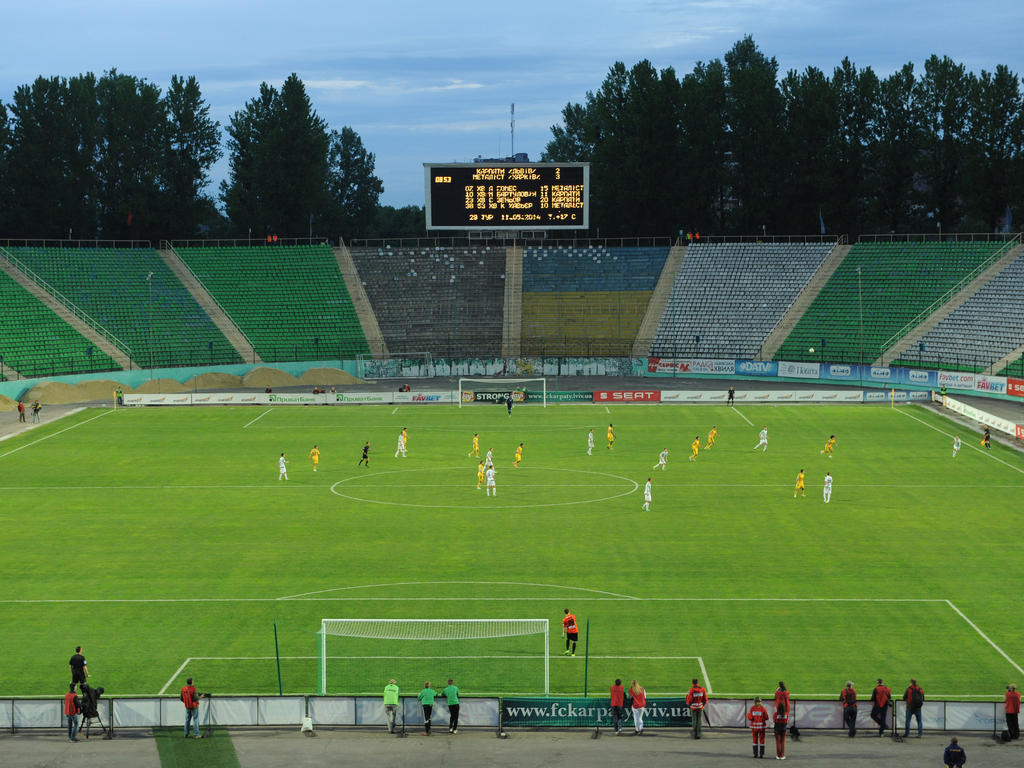War, crisis, football defeats, Ukraine fans in depression

Foreign stars are leaving, clubs are collapsing, crowds are shrinking and Dynamo Kiev suffered the latest blow for long-suffering Ukrainian football fans.
Their 3-1 aggregate defeat by Manchester City in the Champions League last 16 on Tuesday compounded the agony of a nation that proudly hosted the 2012 European Championships but has been at war for the past 23 months.
Clubs like Dynamo and Shaktar Donetsk bought foreign stars that made Ukrainian sides feared in the Champions League.
But conflict and economic crisis has seen the powerful clubs lose funding and home venues are considered too dangerous for opposing sides to visit because of clashes in surrounding streets.
"Everything is collapsing: top foreign players have gone and clubs' budgets have been cut," Ukrainian football analyst Artem Frankov told AFP.
Russia's annexation of the Crimea region in 2014 saw two of the Black Sea peninsula's teams leave Ukraine's top division -- a move that upset UEFA, which barred them from joining the Russian championship.
Meanwhile, Shakhtar Donetsk and a few other eastern teams have been forced to flee their grounds in rebel-held territories and play in Kiev or nationalist western Ukraine.
This allowed them to continue taking part in European competitions, but home support was at times replaced by jeering crowds that rooted for the away team.
The success of Shakhtar and Dnipro Dnipropetrovsk -- surprise finalists of last year's Europa League -- was built around their purchase of stars from Brazil and other nations for huge sums.
But security fears and budget cuts are seeing those players leave for far safer European countries. Brazilian Douglas Costa moved from Shaktar to Bayern Munich last year for an estimated $30 million.
Ukrainian clubs now have to rely on homegrown, untested younger players.
According to Ukraine's Premier League, the past two years have seen the number of foreign top flight players dwindle from 170 to 60. This is reflected in performances on the pitch.
Shakhtar -- owned by Rinat Akhmetov, Ukraine's richest tycoon -- have also sold Brazilian top scorer Alex Teixeira to China's Jiangsu Suning for 50 million euros ($55.5 million).
The money has not been spent on new imports. The clubs need cash.
"The days of teams' full funding (by billionaires) are gone. It is now hard times for all," Shakhtar's chief executive Sergiy Palkin told Novoye Vremya weekly.
Ukraine's political turmoil and conflict have fanned an economic crisis that has thinned the wallets of tycoons like Akhmetov, who finance most Ukrainian clubs.
The cut in funding has forced some of the smaller teams into bankruptcy protection and to drop out of the Premier League, which has shrunk to 14 from 16 clubs since 2014.
But even those still competing suffer from financial turmoil. There have been player strikes over unpaid wages, which many in Ukraine believe were too high from the start.
Perhaps the starkest example of the troubles is Dnipro, which less than a year after its stunning European performance faces possible expulsion from continental competition until 2019.
Club president, banking magnate Igor Kolomoisky has refused to pay wages owed to Dnipro's former Spanish manager Juande Ramos and his assistants.
"Our clubs are fully dependent on their owners' whims," Frankov said.
The decline in football quality has emptied once vibrant stadiums and seen fans switch off their TV sets.
Average match attendance has halved to 6,000 from 12,000 since last year, according to Premier League chief Petro Ivanov.
And those who do come out are often from hooligan fringes, some swearing allegiance to far-right groups renowned for racist behaviour.
One infamous incident spotlighted by Ukrainian television showed Dynamo Kiev fans throw Nazi swastika-emblazened smoke bombs onto the pitch.
A group of Dynamo ultras also attacked local black fans during a Champions League home match against Chelsea.
The team played its next group stage game before an empty stadium as punishment, which it won against Maccabi Tel Aviv.
Analysts say the crises should prompt a reform of the league, with teams' dependence on billionaires' largess replaced by market principles.
"We forgot that football, at least partially, has to feed itself," Frankov said.
"If Ukrainian football wants to survive, it must reform itself."









